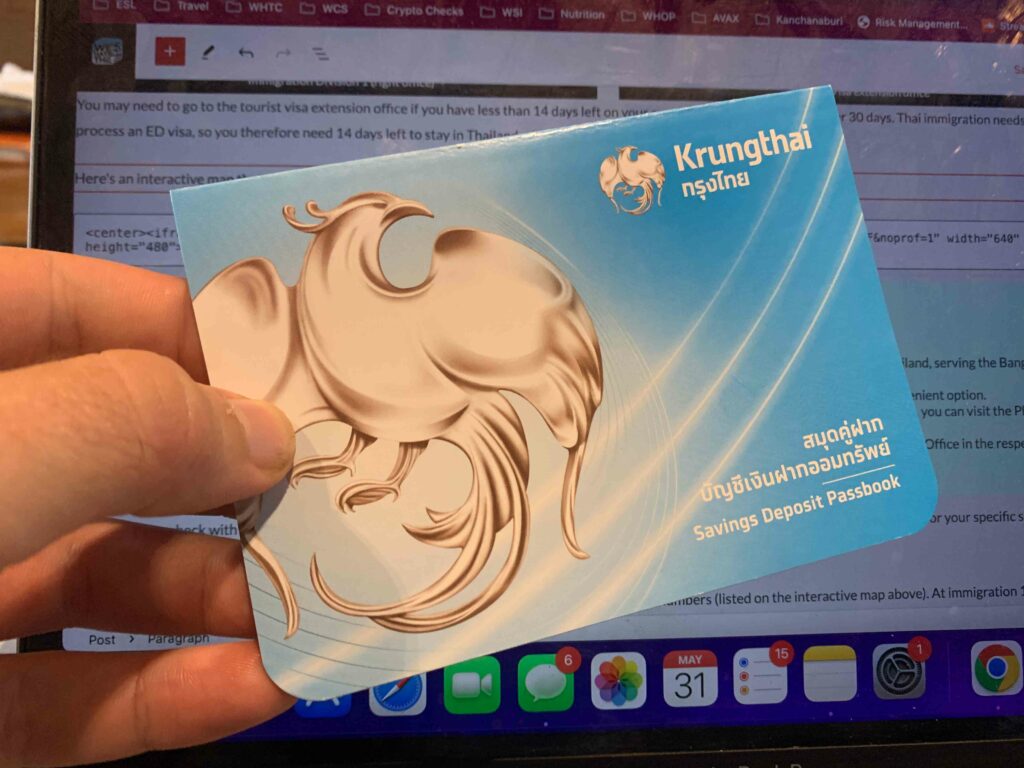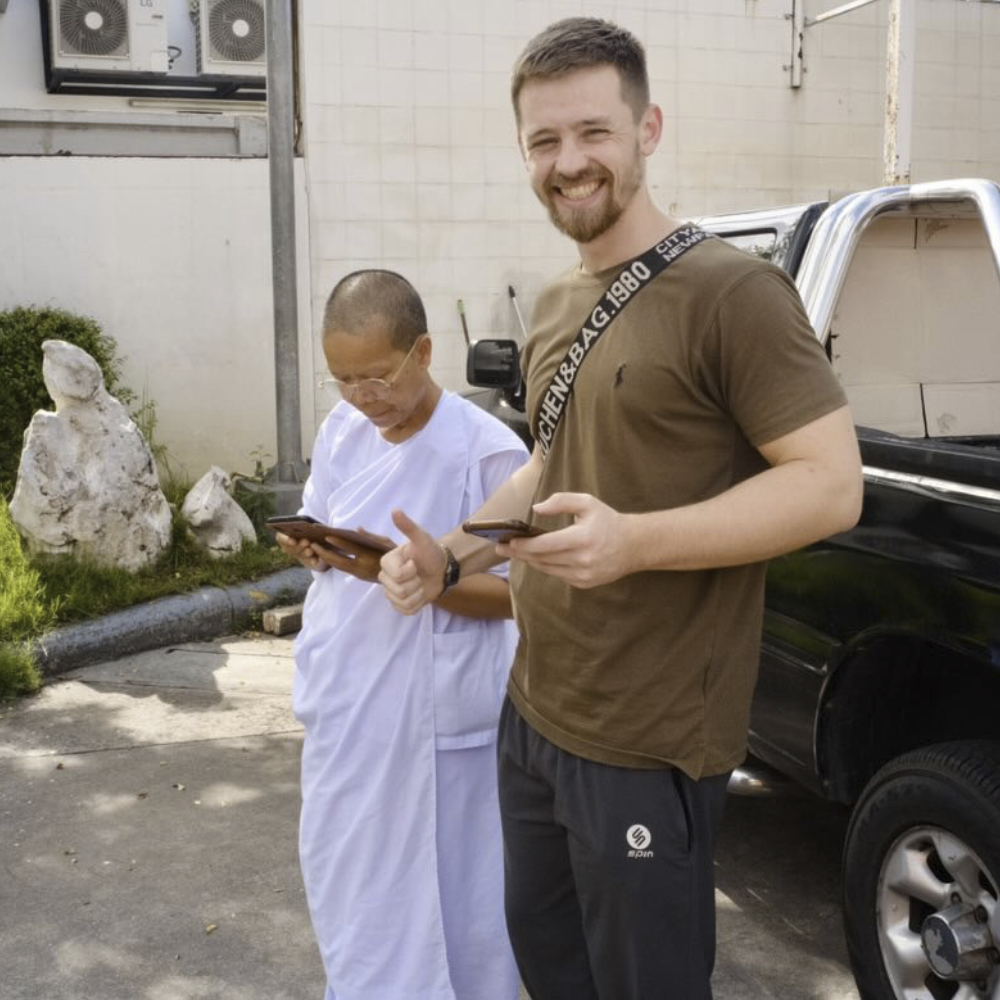So you want to open a bank account in Thailand as a tourist, employee, or student. Well having just gone through the entire process myself, I’m going to share exactly how you can open a bank account while you’re in Thailand. You can open one as a tourist, but the process is far more tricky. The easiest way to open one is to get an ED Visa, Elite Visa or work permit/digital nomad visa equivalent.
Anyway, in this article you’ll learn how to open your first bank account in Thailand, which banks are most likely to accept you and how to avoid the platinum/premium debit card traps.
Notice something missing from the article? Please comment below, and we’ll update it to make this the most helpful, up-to-date resource for travellers.


How To Open A Bank Account in Thailand (Quick Didn’t Read Guide)
Here’s your step-by-step guide to opening a bank account as a foreigner in Thailand:
- Get a condo lease agreement (this is a must)
- Ask for a TM30 from your landlord
- Take your passport, TM30, and at least 500 baht to the bank (needed to deposit and open acc)
- Take a queue ticket, and wait to be called up
- Fill out documents
- Choose your debit card (you don’t need one, they’ll try to upsell you here)
- Download your bank’s app and enter your account number, passport number etc.
- Done!
Most bank accounts will decline you if you don’t have a TM30 or the relevant visa. The bank that most foreigners have success with is Krungthai Bank. If one bank rejects you, go to another and try there.
If you are on a tourist visa it will be improbable that you can open a bank account, but you can try.
Which Bank Account is Most Likely To Accept Foreigners?
After talking to many expats here in Thailand, the bank that most go for is Krungthai bank. They have the easiest acceptance process. Other banks like Bangkok Bank etc. are harder to open. This depends on your visa type. However, if you’re on education or tourist, your best bet is Krungthai Bank.
If you have an Elite Visa, you’ll likely have no issues opening any of the Bank Accounts in Thailand. Again, it depends on what Visa you’re on. As for the new digital nomad visa (just released), we’ll update this article when we know the details.
What Benefits Do You Get Opening a Bank Account in Thailand?
There are a lot of benefits to having a bank account in Thailand. The main benefit is being able to utilise the ScanPay system all across Thailand. Now you can pay for anything, pretty much anywhere using the system. There are also a few more reasons which I’ll list below.
Here are the benefits you get for opening a bank account in Thailand:
- ScanPay system (pay for anything anywhere with 0 fees)
- Withdraw from any ATM in Thailand using your Bank Account’s app (no large 220 baht ATM fees anymore!)
- Receive direct deposits from anyone in Thailand, including your employer or pension
- Splitting the bill with your friends is so much easier
- Pay bills online conveniently
- Get a long-stay visa, as having a bank account is often a requirement
If I find any more benefits of having a bank account during my stay here I will update this article accordingly. Or if you now of any benefits, please comment below. We are eager to update the article with the most up-to-date information to be the most helpful resource for travellers.
Eligibility Requirements
To open a bank account in Thailand, you typically need to meet the following requirements:
- Have a valid visa (non-immigrant visa, extension of stay, visa exemption stamp, or short-stay visa)
- Provide proof of residency in Thailand (rental agreement, utility bill, or Thai residence permit)
- Letter from school or place of work (with official stamp)
- Passport with validity of 6 months left
- 500 baht cash to deposit into the account
The specific requirements may vary depending on the bank and the type of account you’re opening. Some banks may have additional requirements, such as a work permit or a minimum deposit amount.
When I opened my account at Krungthai, they only needed a letter from the school, TM30, a passport and 500 baht cash.
How Long Does it Take To Open A Thai Bank Account?



The entire process takes about an hour from start to finish. This includes waiting in the queue, talking to the representative, filling in the forms, and depositing cash in the account.
In my experience, it took 1 hour to open the account. It was a very easy and smooth process, just ensure you arrive with all the right documents and in presentable clothing. When I had left the bank, I had a fully operating account and paid for a drink at Starbucks using the ScanPay system for the first time in my life – it was a proud moment.

Avoiding The Premium Debit Card Trap

When you sign up as a foreigner the bank will try to upsell you a special debit card that offers accident cover, some breakdown cover and other things. This is fairly cheap at 1500 baht ($40.78 USD) per year maximum so, if you’re staying in Thailand long-term, this might be a fantastic option for you. However, it will seem like you need a debit card to withdraw from an ATM, and some of the options tell you that you have to pay fees when using a debit card.
If you have a bank account, a phone with charge and an app, you can withdraw from any ATM, anywhere without having to pay fees at all.
How do I know this?
I’ve personally done this, and I asked my Thai friends if this was possible. They all said yes and said there was no reason to pay extra for the debit card, unless you wanted the insurance that came with it.
Types of Bank Accounts
There are several types of bank accounts available in Thailand:
| Account Type | Description |
|---|---|
| Savings Account | A basic account with a passbook and a debit card. Suitable for most individuals. |
| Current Account | Similar to a checking account. Comes with a checkbook and usually requires a work permit. |
| Fixed-term Account | Interest-bearing account with a fixed term. Suitable for depositing savings. |
| Foreign Currency Account | Allows you to hold and manage foreign currencies. |
For most foreigners, a savings account is the easiest and most suitable option.
Choosing the Right Bank
With many banks operating in Thailand, choosing the right one can be a daunting task.
Here are some popular banks that are considered foreigner-friendly:
- Bangkok Bank: The largest bank in Thailand, with a wide network of branches and ATMs. Known for their excellent services for foreigners.
- Kasikorn Bank: One of the largest banks in Thailand, offering convenient international money transfers and mobile banking.
- Citibank: A major international bank with a strong presence in Thailand. Offers fee-free ATM withdrawals worldwide and English-speaking staff.
- Krung Thai Bank: A government-owned bank with a large network of branches. Often has a lower barrier for opening accounts.
- Siam Commercial Bank: Known for its user-friendly mobile app and a wide range of insurance policies.
- CIMB Bank: Formerly known as Bank Thai, this bank is foreigner-friendly and may allow you to open an account on a tourist visa.
- Krungsri Bank: Offers excellent digital banking and easy international transfers.
When choosing a bank, consider factors such as branch and ATM locations, English-speaking staff, and the range of products and services offered for foreigners.
Banking Fees in Thailand
Banking fees in Thailand can vary significantly from what you’re used to in your home country. It’s crucial to review the terms and conditions carefully to avoid unexpected charges.
Here are some common fees to be aware of:
- Card Fees: These include entrance fees (around 100 THB), annual fees (250 THB or more), and transaction fees.
- ATM Withdrawal Fees: Expect to pay around 100 THB for withdrawals from non-affiliated ATMs, plus additional operator fees.
- Foreign Transaction Fees: Many banks charge a fee of around 2.5% for transactions in foreign currencies.
- Domestic Transfer Fees: These fees can vary depending on the speed of service and the amount transferred.
- International Transfer Fees: Sending money internationally can be costly, with both fixed fees and marked-up exchange rates.
Can I Open A Bank Account Online As A Foreigner?
No, you need to go directly into the branch to open up an account as they require certain information from you to do so.
Can I Open A Bank Account From My Country as A Foreigner?
No, this is not possible as the bank requires certain information, visas etc. This all needs to be done in person.
How Do I Deposit Money Into My Bank Account?
Find a CDM for your bank brand, or go directly to the branch. Take your account number and your passport with you, alongside your deposit booklet (given to you upon opening an account). Follow the instructions on screen, or given to you by the assistant, then deposit the cash directly into your account.

I’m Harry – and I was tired of the same old “10 best places I’ve never been but I’m writing about for some reason” blog posts. So… I’m a young traveller on a mission to travel the world and share my true, unfiltered experience, including all the gristly details. From packing my life into one bag for a year, to traveling Vietnam by motorbike, to sorting out Visas for specific countries – I’ve done it all, am doing it all and only give my advice on things I have done – not regurgitated cr*p from another source *cough* most publications *cough*. So bear with us! This project will take some time to grow, and will take a fair bit of money. But I’m determined to make it the single best source of information about traveling on the internet.
